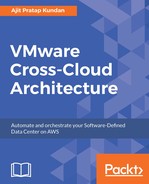VMware vCenter enables centralized storage management within this design, which allows for configuration and management of the following storage types:
- Local disk storage: Local hard disk drives (HDD) or solid state drives (SDD) that are attached to the local ESXi hosts.
- Storage area attached storage (SAN): Remote block storage that is attached to the ESXi host via fiber channel or TCP/IP protocols.
- Network attached storage (NAS): File-based storage that is attached to the ESXi hosts via the NFS protocol.
- Virtual SAN storage: Configured within the cluster object in vCenter, it enables the aggregation of local disk storage across ESXi hosts into a shared pool of storage across all ESXi hosts within a given cluster. An outage of the vCenter server does not affect the availability of vSAN storage to the cluster once it is configured.
vCenter management of storage is primarily focused on NAS and vSAN storage as SAN is not employed within this architecture. ESXi host OS and swap space are used on local non-vSAN disk storage.
NFS storage management
vCenter is responsible for configuring the mounting of NFS data stores to each ESXi host within a cluster. This confirms its access availability to any virtual machine with virtual disk files (VMDK) residing on the NFS-based data store. vMotion of the virtual machine from one ESXi host to another occurs within a cluster.
vSAN storage management
The vCenter interface or web API has the capability of configuring vSAN data stores for a particular cluster at the cluster object level within the vCenter interface. Configuring vSAN within vCenter involves the following areas of configuration:
- Licensing: Prior to enabling vSAN, a valid license within the vCenter licensing section is required.
- vSAN network: You have to configure the network which vSAN will use for its back plane network. Virtual machines have storage which is fault tolerant across a host's local disks on this network.
- Disk group configuration: Each ESXi host which contributes its local disks to a Virtual SAN cluster has its disks organized into disk groups. A disk group is a main unit of storage on a host. Each disk group includes one SSD and one or multiple HDDs.
- vSAN policies: Storage policies define the virtual machine storage characteristics. Storage characteristics specify different levels of services for different virtual machines.
